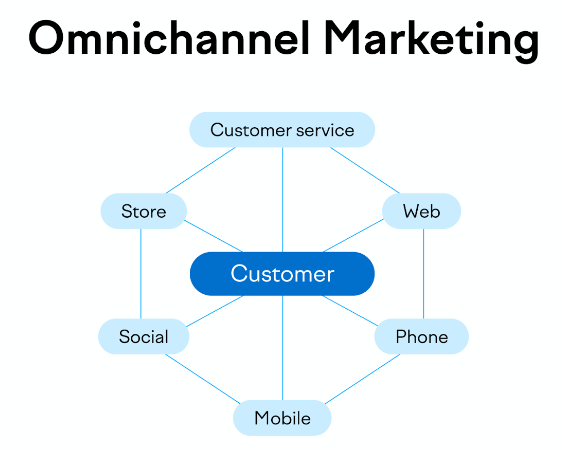Omnichannel Marketing
What is Omnichannel Marketing
Definition:
Omnichannel marketing is a strategic approach that integrates multiple communication channels and touchpoints to deliver a seamless and cohesive brand experience to consumers across various platforms and devices. Unlike multichannel marketing, which focuses on using multiple channels independently, omnichannel marketing emphasizes continuity and consistency in customer interactions, regardless of the channel or device used.
Analogies:
Think of omnichannel marketing as a symphony orchestra, where each instrument plays its part harmoniously to create a unified and immersive musical experience. Similarly, omnichannel marketing orchestrates various marketing channels and touchpoints to create a cohesive and seamless brand journey for consumers.
Further Description:
Omnichannel marketing leverages a combination of online and offline channels, including websites, mobile apps, social media, email, physical stores, and more, to engage consumers at every stage of their buying journey. The goal is to provide a consistent and personalized experience across all touchpoints, enabling consumers to seamlessly transition between channels while maintaining continuity in their interactions with the brand.
Key Components of Omnichannel Marketing:
- Integration of Channels: Omnichannel marketing requires the seamless integration of all marketing channels and touchpoints, ensuring that consumer interactions are cohesive and consistent regardless of the channel or device used.
- Unified Customer Data: Centralized customer data platforms allow marketers to gather and analyze data from various channels, enabling them to gain insights into consumer behavior, preferences, and engagement across the entire omnichannel ecosystem.
- Personalization and Targeting: Omnichannel marketing enables personalized and targeted messaging based on consumer preferences, behaviors, and past interactions, enhancing the relevance and effectiveness of marketing communications.
- Cross-Channel Coordination: Effective omnichannel marketing requires coordination and alignment across all channels and departments within the organization, ensuring a unified approach to customer engagement and brand messaging.
Benefits of Omnichannel Marketing:
- Enhanced Customer Experience: Omnichannel marketing provides consumers with a seamless and personalized experience across all touchpoints, fostering deeper connections and loyalty to the brand.
- Improved Engagement and Conversion: By delivering relevant and timely messages to consumers based on their preferences and behaviors, omnichannel marketing increases engagement and conversion rates, driving revenue and growth for the business.
- Better Insights and Measurement: Omnichannel marketing allows marketers to gain valuable insights into consumer behavior and campaign performance across multiple channels, enabling data-driven decision-making and optimization.
- Increased Brand Consistency: Consistent messaging and branding across all channels reinforce brand identity and values, building trust and credibility with consumers over time.
Challenges of Omnichannel Marketing:
- Data Integration Complexity: Integrating data from disparate sources and channels can be challenging, requiring robust technology solutions and data management practices to ensure accuracy and consistency.
- Organizational Alignment: Achieving alignment and coordination across different departments and teams within the organization is essential for successful omnichannel marketing execution.
- Technology Investment: Implementing omnichannel marketing initiatives may require significant investments in technology platforms, infrastructure, and resources to support data integration, analytics, and automation capabilities.
Key Takeaways:
- Omnichannel marketing is a strategic approach that integrates multiple channels and touchpoints to deliver a seamless and personalized brand experience to consumers.
- Key components of omnichannel marketing include channel integration, unified customer data, personalization, and cross-channel coordination.
- Omnichannel marketing offers benefits such as enhanced customer experience, improved engagement and conversion, better insights and measurement, and increased brand consistency, but it also poses challenges related to data integration complexity, organizational alignment, and technology investment.
Table of Contents





